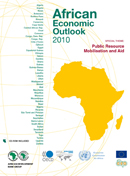|

|
Publication Date:
24 May 2010
ISBN Number:
9789264086524
|
|
|
|
The 2010 African Economic Outlook finds the continent reeling from the effects of the world’s deepest and most widespread recession in half a century. Many countries are at risk of falling far off track to achieving the Millennium Development Goal of halving extreme poverty and hunger by 2015. Just how hard was the region hit? What are the prospects for recovery? Insights and answers in this edition including an in-depth study of Taxation and Aid in Africa.
It was presented in Abidjan, Côte d'Ivoire at the 45th African Development Bank Annual Meetings, on May 24.
|
|
Now in its ninth year, the AEO is the only report on Africa which applies a common analytical framework to every country, every year. This allows for a comparison of economic prospects at the regional, sub-regional and country levels.
Produced by the OECD Development Centre, the African Development Bank and the United Nations Economic Commission for Africa, the AEO is the essential reference on Africa. It benefits from the support of the European Commission.
|
|
MAJOR FINDINGS OF THE REPORT
AEO in 60 seconds / Africa in 2008: Breaking Down the Growth
|
DID YOU KNOW ?
|
|
 80% of the African countries covered in the AEO registered positive growth in 2009 as compared to only 10% of OECD countries.. 80% of the African countries covered in the AEO registered positive growth in 2009 as compared to only 10% of OECD countries..
Africa in 2008: Breaking Down the Growth |
 Low Income Countries in Africa still collect less than 15% of GDP in taxes while Upper Middle Income countries collect 35%, almost on par with OECD countries. Low Income Countries in Africa still collect less than 15% of GDP in taxes while Upper Middle Income countries collect 35%, almost on par with OECD countries.
|
|
 Africa is one of the most undiversified regions in the world: approximately 80% of its exports are based in oil, minerals and agricultural goods.. Africa is one of the most undiversified regions in the world: approximately 80% of its exports are based in oil, minerals and agricultural goods..
|
 Resource-related taxes have increased from 5 to 15% of GDP over the last 15 years. In Equatorial Guinea alone,over 95% of taxes collected come from natural resources. Resource-related taxes have increased from 5 to 15% of GDP over the last 15 years. In Equatorial Guinea alone,over 95% of taxes collected come from natural resources.
|
|
HOW TO OBTAIN THE PAPER VERSION OF THIS PUBLICATION?
|
|
Readers can access the full version of African Economic Outlook 2010 choosing from the following options:
Subscribers and readers at subscribing institutions can access the online edition via SourceOECD, our online library.
-
Non-subscribers can purchase the PDF e-book and/or paper copy via our Online Bookshop.
-
-
|

 80% of the African countries covered in the AEO registered positive growth in 2009 as compared to only 10% of OECD countries..
80% of the African countries covered in the AEO registered positive growth in 2009 as compared to only 10% of OECD countries..